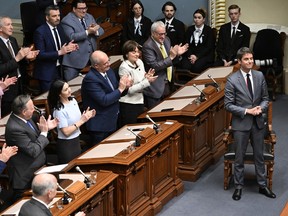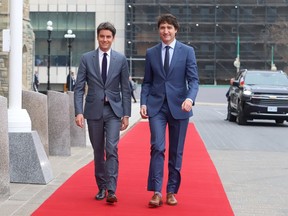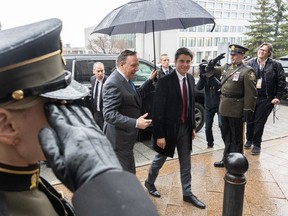French PM encourages Quebec’s language and secularism policies
[ad_1]
He avoided talking about independence, but Gabriel Attal did not hesitate to dive into the hot issues on his visit to the National Assembly.

Article content
QUEBEC — The prime minister of France kicked off a visit to Quebec Thursday by telling legislators they are right to stand up and defend the French language and adopt controversial policies on secularism, which he said “are nothing to be ashamed of.”
In a much-anticipated speech to the National Assembly, Gabriel Attal said France stands with Quebec and encourages it in its efforts to save and promote its language and culture.
Advertisement 2
Article content
Article content
With a beaming Premier François Legault and other MNAs listening closely and the French flag flying atop one of the towers of the legislature, Attal said Quebec has shown the world what has to be done to survive and thrive despite its situation as French-speaking minority in a sea of North American English.
“Some thought no doubt that French would disappear from the map in North America,” Attal said. “They did not know Quebecers. Quebecers have shown and still show what happens when we refuse to cede to fatality, that the only future destiny is to disappear.”
“We must all remain vigilant. You can count on France to accompany you to promote the French language in Quebec.”
But the remarks that earned him a standing ovation from the house were when he addressed the issue of secularism, a hot topic in France — which has much stricter laws on the matter — and in Quebec, which has banned certain persons in situations of authority from wearing religious symbols.
“I know that laicity is the condition to living well together and I know Quebecers’ representatives are attached to laicity,” Attal said standing at a podium in front of the throne.
Advertisement 3
Article content
“To those who insist on not understanding what laicity is, who try to deform it, to make it seem it is somehow an anti-religion weapon, to make people think it is form of negation of religion, to say it is a form of discrimination, we respond that laicity is a condition of freedom, equality and fraternity.”
“We should never be ashamed of these values, our values, so let us defend them every day, with strength, conviction and courage, defend them without ceding a millimetre to those who want to call them into question, defend them because they are at the heart of our identity.
“Identity is what makes you Quebecers and we the French individual beings. Defending them is refusing to be on the periphery of history and to assume its place in history, for France and Quebec.”
Later, rising to thank Attal, Legault described the speech as “inspiring.. He noted that Quebec, in its approach to secularism, did not go as far as France with its Bill 21. And he knows not everyone in Quebec or France accepts the rules.
“But I know, on laicity, Quebec and France speak with one voice,” Legault told the house.
Article content
Advertisement 4
Article content
He quoted French president Emannuel Macron who said this year he “wanted to govern so that France stayed France.”
“I can relate to this,” Legault said. “I also want to govern so that Quebec stays Quebec.”
The one theme Attal did not wade into was the question of Quebec independence, joking that, as a 35-year-old man, he was six years old when Quebec’s last referendum took place in 1995.
And he never knew the late French president Charles de Gaulle, who uttered his famous “Vivre le Québec libre,” from the balcony of Montreal city hall.
The closest he came was in his parting words at the end of his speech when he said: “Vivre le Québec, vivre la France et vivre l’amitié franco-Québécoise” (long live Quebec, long live France, and long live franco-Quebec friendship).
“I was not surprised or saddened to not hear you pronounce the words, ‘Vivre le Québec libre,” Parti Québécois leader Paul St-Pierre Plamondon told Attal when he had his chance to respond in the house. “All the French politicians who came to visit us since that historic speech are conscious of the weight of the general’s words and the hope he created at that time.”
Advertisement 5
Article content

But earlier in the day, wrapping up a meeting with Prime Minister Justin Trudeau in Ottawa, Attal was asked whether he endorsed France’s prudent, traditional political doctrine when it comes to the issue of Quebec’s future in Canada.
Asked by a reporter if he supports France’s “non-interference, non-indifference,” policy, Attal responded directly.
“I find this phrase speaks volumes and I am very comfortable with it,” Attal said with Trudeau standing beside him.
Trudeau rapidly waded in, saying there is no diplomatic tug-of-war — as has happened in the past — with France’s outlook on Quebec.
“I’m very happy my beautiful province of Quebec also has privileged relations with France,” Trudeau said. “There’s no contradiction in this and we will continue to work hand in hand to build bridges between both sides of the Atlantic.”
The policy was adopted by former French president Valéry Giscard d’Estaing in 1977 as a way to navigate the Quebec-Canadian realities without upsetting political parties and citizens, whether they are federalist or in favour of independence.
Advertisement 6
Article content
In 2008, former French president Nicolas Sarkozy touched off a storm when he dumped the doctrine on a visit to Quebec, making a pitch for Canadian unity instead.
France returned to the policy in 2012 when François Hollande was president and it has been policy ever since.
But Attal seemed to impress Quebec politicians for his more easy-going style.
Named in January, Attal, 35, is the youngest person in France’s history to become prime minister. He is often touted as a possible successor to President Emmanuel Macron.
It is the first time in 40 years that a French prime minister has addressed the National Assembly. Former French president François Hollande did give a speech in November 2014.
It’s also the first time since 2018 that the French and Quebec governments stage a repeat of their alternating bilateral meetings, a tradition which had to be suspended owing to the COVID-19 pandemic and various political realities in France.
Attal’s three-day visit started Wednesday in Ottawa before shifting to Quebec City Thursday.

Attal and his team, which includes five ministers and 30 aides, arrived in the provincial capital under rainy skies and an hour late but proceeded immediately to the premier’s office in the Honoré-Mercier building where Attal signed the visitor’s book.
Advertisement 7
Article content
Each leader made a statement.
“We have roots in France and a shared history,” Legault said as Attal stood by him. “We have many subjects to discuss including the future of our language, French. In North America, Quebec is the only area with a francophone majority, which is nice but a lot of responsibility.
“We’ll be able to talk about the future of French, about laicity and trade.”
“I’m very happy and moved to be here,” Attal responded. “What’s at stake is more than the future of France and Quebec. It is the future of the francophonie but the defence of certain values which are dear to us and we share.”
Later, Attal was carried by his motorcade around the block to the legislature where he was greeted on the steps by the speaker of the legislature, Nathalie Roy, who held an umbrella over Attal’s head as he walked up the stairs into the legislature.
Before his speech, Attal also made a short stop for handshakes and photos with the three opposition leaders.
The opposition parties have been cautious in their comments on the visit, welcoming the opportunity to renew ties but also anxious to hear what Attal would say on the Quebec political situation, a traditional hot-button topic at such events.
Advertisement 8
Article content
Québec solidaire, which is pro-independence, said its members hoped to hear Attal at least re-affirm France’s standard political line when it comes to Quebec’s future, the “non-interferance, non-indifference,” doctrine.
Interim Liberal leader Marc Tanguay said the Liberals have always been fine with that doctrine because it recognizes the democratic rights of Quebecers.
“It’s up to Quebecers to decide,” Tanguay said this week.
The leader who went the furthest was St-Pierre Plamondon, who told reporters this week that he considers France an important element in his party’s strategy to make Quebec an independent country.
“Recognition by the greatest number of counties is clearly important … but even more so for France because the friendship is stronger,” St-Pierre Plamondon said. “Our destinies have been linked for a long time.”
But in an interview with the Journal de Montréal published Thursday, St-Pierre Plamondon added: “Quebec needs France and we ask France to accompany us in our choices because these choices are coming, they are coming rapidly.”
Asked about the comments Thursday, PQ MNA Pascal Paradis insisted the PQ is not trying to tell Attal what to say to advance the PQ’s own cause.
“The speech he delivers at the National Assembly belongs to him,” Paradis said. “He will make the statements he considers adequate. We are not about to start telling the prime minister, Gabriel Attal, want he should say or not say in his speeches.”https://montrealgazette.com/news/local-news/french-pm-to-visit-ottawa-quebec-city-and-montreal-during-canadian-visit
Recommended from Editorial
Advertisement 9
Article content
Article content

Comments are closed.